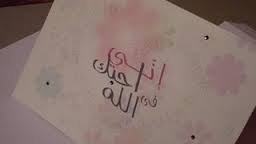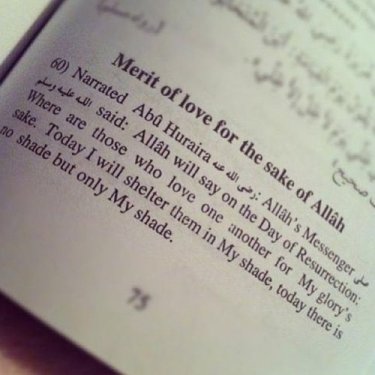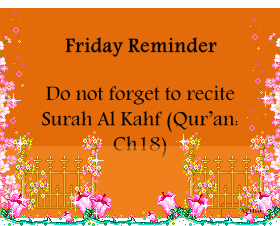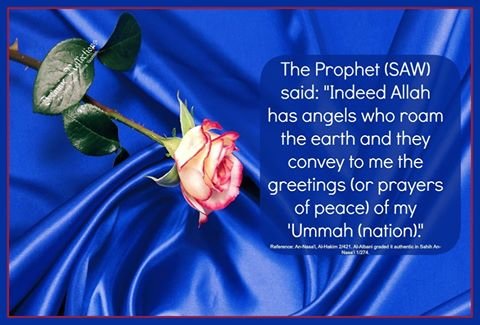-
Posts
8,462 -
Joined
-
Days Won
773
Content Type
Profiles
Forums
Events
Everything posted by ummtaalib
-
-
".........Messenger of Allah (sallallaahu ’alayhi wa sallam) asked, "Have you informed him?'' He said, "No". Messenger of Allah (sallallaahu ’alayhi wa sallam) then said, "Tell him (that you love him)". Tell the person you love that you love them!
-
I Love you for the sake of Allah Abu Karima al-Miqdad ibn Ma'dikarib reported that the Prophet, may Allah bless him and grant him peace, said, "If a man loves his brother, he should tell him that he loves him." [Abu Dawud and at-Tirmidhi] Anas bin Malik (May Allah be pleased with him) reported: A man was with the Prophet (sallallaahu ’alayhi wa sallam) when another man passed by and the former said: "O Messenger of Allah! I love this man (for Allah's sake)". Messenger of Allah (sallallaahu ’alayhi wa sallam) asked, "Have you informed him?'' He said, "No". Messenger of Allah (sallallaahu ’alayhi wa sallam) then said, "Tell him (that you love him)". So he went up to the man and said to him, "I love you for the sake of Allah;'' and the other replied, "May Allah, for Whose sake you love me, love you.'' [Abu Dawud].
-
-
Love for the sake of Allah Abu Hurayra reported that the Messenger of Allah, may Allah bless him and grant him peace, said, "Allah Almighty will say on the Day of Rising, 'Where are those who loved one another for the sake of My majesty? Today, on the day when there is no shade but My shade, I will shade them.'" [Muslim] Abu Hurayra reported that the Prophet, may Allah bless him and grant him peace, said, "A man visited a brother of his in another village and Allah positioned an angel to wait for him on his way." He mentioned the hadith to his words, "Allah loves you just as you love him for His sake." [Muslim] Mu'adh said, "I heard the Messenger of Allah, may Allah bless him and grant him peace, say, 'Allah, the Mighty and Exalted, says, "Those who love one another for My majesty will have minbars of lights. The Prophets and martyrs will envy them."'" [at-Tirmidhi] Hadith Collection from Sunnipath
-
Cannot resist posting one of favourites! RAABI’AH BASRIYYA This great saintly woman was once seen walking the streets carrying a pail of water in one hand and a fire in the other. On being asked the reason she replied, “I wish I could burn the gardens of Jannat with this fire and put out the fire of Jahannam with this water. Then people will worship Allah subhaanahu wata’ala for His pleasure alone and not for entry into Jannat or for safety from the fire of Jahannam”.
-
A Despicable Man Posted by: TheMajlis “And if you decide to change one wife for another wife (i.e. divorce a wife to marry another woman), and you had already given one of them abundant wealth (by way of gifts), then do not take back from her anything. What! Do you repossess it by way of usurpation and flagrant transgression? And how indeed can you take it back after having mutually met (i.e. after having consummated the marriage), and after they (women) have obtained from you a sacred pledge (of Nikah)?” (Surah Nisaa’) A very common reaction of spiteful men of low moral calibre and defective intelligence, when the marriage ends, is to demand that his ex-wife returns all the expensive gifts which he had given her at a time of mutual enjoyment and pleasure. USURPATION The Qur’aan Majeed describes such repossession of gifts as usurpation. It is unjust, despicable and totally unbecoming of a honourable man to degenerate to the low ebb of reclaiming gifts from a woman who was his lawful wife and with whom he had enjoyed conjugal relations. VOMIT Rasulullah (sallallahu alayhi wasallam) said that a person who repossesses a gift is like a dog which laps up its own vomit. In many cases when the marriage collapses, the husband goaded on by his parents or bristling with malice, demands that his ex-wife returns all the expensive gifts he had given her in happier times. UNLAWFUL This attitude is abominable and totally at variance with Muslim moral character. Besides the morality of the issue, reclaiming gifts from a wife is not permissible nor valid. If by pressure, the man manages to take possession of the gifts, he does not become the owner. The gifts remain in the ownership of the woman who was once upon a time his wife. The excuse that the jewellery, etc. were given to the wife on loan is not valid after the marriage ends in divorce unless the man can prove with acceptable evidence that he had made such a declaration to the woman at the time when he gave her the assets. CUSTODY The husband’s or his parents’ custody of the items do not make him the owner thereof. It is normal for the wife to leave her expensive jewellery in her husband’s custody for safe-keeping. He holds it as an amaanat for her. As long as she had taken possession of the gifts, she remains the owner. When the heart-breaking event of divorce takes place, the husband should acquit himself honourably by softening the blow. He should not compound the tragedy for the sake of finding gratification for his spiteful and malicious attitude. The assets should be given to her without any problem or hassling. Many Sahaabah lauded their wives with substantial gifts on the occasion of divorce. Acrimony and malice did not feature in the dissolution of their marriages. Divorce at times becomes necessary. When the tragedy occurs, Allah Ta’ala should not be obliterated from the mind.
-
-
Assisting one's father with Zakaat Q. My father is battling and I know for a fact that he is always short every month as he is a pensioner and does not have any other source of income. Can I give him my Zakaat? (Query published as received) Answer A child cannot give his/her parents Zakaat and vice versa. You cannot assist your father with Zakaat funds. You can assist him with funds with the intention of optional Sadaqah if you wish or other family members (eg, his brothers, nephews etc) can assist him with Zakaat. A wife may not giver her Zakaat to her husband and vice versa. And Allah Knows Best Mufti Suhail Tarmahomed Fatwa Department Jamiatul Ulama (KZN) Council of Muslim Theologians
-
Q: A person gave zakaat to a muslim whom he regarded to be eligible for zakaat. However, after giving him the zakaat he discovered that he was unworthy of zakaat. Is the zakaat discharged? A: If a person discharged the zakaat to a muslim whom he regarded to be eligible for zakaat then the zakaat will be discharged. ( دفع بتحر ) لمن يظنه مصرفا ( فبان أنه عبده أو مكاتبه أو حربي ولو مستأمنا أعادها ) لما مر ( وإن بان غناه أو كونه ذميا أو أنه أبوه أو ابنه أو امرأته أو هاشمي لا ) يعيد لأنه أتى بما في وسعه حتى لو دفع بلا تحر لم يجز إن أخطأ (شامى 2/352) Answered by: Mufti Zakaria Makada Checked & Approved: Mufti Ebrahim Salejee (Isipingo Beach)
-
Q: Will the zakaat be fulfilled if it is given under the pretext of a gift or a loan? A: If the person discharging the zakaat has the intention of zakaat at the time he gifted the wealth or loaned it to the poor person, the zakaat will be discharged. However, in the case where he gave the zakaat as a loan it is impermissible for him to take back the wealth. If he takes it back he will be sinful. قوله ( نية ) أشار إلى أنه لا اعتبار للتسمية فلو سماها هبة أو قرضا تجزيه في الأصح ( شامى 2/268) Answered by: Mufti Zakaria Makada Checked & Approved: Mufti Ebrahim Salejee (Isipingo Beach)
-

THE STYLE OF RASULULLAH’S GARMENT
ummtaalib replied to ummtaalib's topic in Muhammad (Sallallaahu 'alayhi wasallam)
If gambling is involved in chess, it is categorically prohibited and without gambling being involved there is a difference of opinion in its prohibition Please see: Inter-Islam: Chess and Islam Askimam: Ruling on chess in Islam darul-Iftaa: Playing Chess -

Information on 15th Sha'baan - Night Of Barãt
ummtaalib replied to ummtaalib's topic in General Islamic Articles
This ruling applies to the men. Al-Bukhaari reported that the Prophet (peace and blessings of Allaah be upon him) said: "Whatever of the izaar (lower garment) is below the ankles is in the Fire." (al-Bukhaari, no. 5787) Detail Here -
THE STYLE OF RASULULLAH’S GARMENT By Mujlisul Ulama of South Africa When a modernist Muslim criticizes the dress style and appearance of Rasulullah (sallallahu alayhi wasallam) and the Sahaabah, we in this age in which kufr preponderates, are not surprised. Immersed in the kufr concepts and liberalism of the western kuffaar, it is just natural and logical for modernists to denigrate every teaching of the Sunnah which conflicts with the tastes and hues of western culture. In fact, even Ulama have become so terribly desensitized with the kufr of the modernists as a consequence of their mutual association and their dubious and baseless policies of ‘hikmat’ and diplomacy, that they (the Ulama) too have become chronic victims of the maladies of kufr and liberalism. So while we cannot be surprised when modernists criticize, mock and sneer at the dress styles and appearance of Rasulullah (sallallahu alayhi wasallam) and his Sahaabah, there is not only surprise but shock when molvis —products of Darul Ulooms - who purport to be followers of the Ulama of the Sunnah, resort to labyrinthal arguments in order to justify styles which are in conflict with not only the practical example of the Nabi, but in diametric opposition to his explicit statements of prohibition pertaining to certain dress styles. THE TROUSERS Every molvi is aware or should be aware that ALL the Books of Hadith contain many authentic ahadith clearly explaining the style of Rasulullah’s izaar. There is absolutely no difference of opinion among any of the innumerable authorities of the Shariah from the very inception of Islam that Rasulullah (sallallahu alayhi wasallam) and his Sahaabah always wore their izaar and trousers above their ankles. In addition to their practical example, Rasulullah (sallallahu alayhi wasallam) and the Sahaabah verbally propagated in explicit terms the prohibition of wearing the trousers below the ankles. This style is completely unrelated to age and time. There was no incumbency of the era to wear the trousers in this manner nor were there any physical or geographic restraints or factors which compelled the adoption of this style. on the contrary, the age and the people of the time demanded that the trousers be worn below the ankles in exactly the same way as modernists, kuffaar and Muslims ashamed of the Sunnah Culture are advocating today. THE REASON In order to accomodate the liberal fancies of the western kuffaar, molvis in this age of corruption, have hooked onto a legless and baseless argument to justify, propagate and even praise the kaafir style of wearing the trousers below the ankles—a style which is in clear opposition to the style and command of Rasulullah (sallallahu alayhi wasallam). The modernist molvis of the liberal cult of westernism are arguing that the reason for the prohibition to wear the trousers below the ankles was pride. Their argument goes that on account of pride, the style was prohibited. But if there is no pride then wearing the trousers below the ankles is permissible, in fact commendable by implication of their baseless and satanic arguments which they voice over their radio channels. Why is it haraam for a Muslim to wear a crucifix around his neck or arm? Why should it be haraam for a Muslim to keep a small idol of Bhagwan or Buddha in his pocket or display it in his home. Why should this be haraam if the Muslim concerned has no beliefs of shirk or kufr. He simply regards these items as ‘artifacts’ and symbols of ‘history’. He does not believe in these idols. He does not worship them. But we can claim without fear of contradiction that even the modernist molvis have as yet not descended to the level of corruption which will constrain them to say that keeping such idols is permissible if the reason is not shirk/worship. Although this is still the case presently, we know that there will soon come a time when keeping and admiring even these instruments of shirk and kufr will be justified and made legal by the presentation of the argument that the reason for the initial prohibition was the belief of shirk which had not yet been completely eradicated from the hearts of the new converts to Islam. CATEGORIC PROHIBITION When the Shariah categorically prohibits an act or practice, the prohibition will endure regardless of the reason for which it was initially prohibited. Reciting the qira’t jahran (aloud) in Zuhr and Asr was prohibited initially on account of a particular reason which soon after the prohibition no longer existed. But inspite of the disappearance of the reason for the prohibition, the hukm of Sirri (silent) recitation will endure until the day of Qiyaamah. Rasulullah (sallalahu alayhi wasallam) said that he who plays chess is like one who has dipped his fingers in the blood of a swine. Surely there was a cogent reason for this stern prohibition. Now, regardless of whether that reason exists in some cases or not, the prohibition of playing chess will remain until the day of Qiyaamah. In fact, the prohibition has been taken further by the Fuqaha (the Authorities of the Shariah). This prohibition has been extended to all similar games of the kuffaar. THE AHADITH We shall now present the relevant authentic Ahadith on the issue of the trousers below and above the ankles and then proceed to further refute and negate the utterly baseless and devious arguments tendered by modernists molvis to beguile the Ummah. (1) Abu Hurairah (Radhiyallahu anhu) narrates: Rasulullah (sallallahu alayhi wasallam) said: "Whatever of the garment is below the ankles will be in the Fire (of Jahannum).(Bukhaari) (2) Ibn Umar (Radhiyallahu anhu) narrates: "Verily the Nabi (sallallahu alayhi wasallam) said: Whoever hangs his garment in pride, Allah will not look at him (with mercy) on the day of Qiyaamah." (Bukhaari and Muslim) (3) Abu Saeed al-Kudri (Radhiyallahu anhu) narrates: "I heard Rasulullah (sallallahu alayhi wasallam) saying: The izaar of the Mu’min is halfway on the forlegs (i.e.midway between the knees and the ankles). There is no sin on him in that which is between it and the ankles. And, whatever is below this is in the Fire (of Jahannum). He (Rasulullah —sallallahu alayhi wasallam) repeated this statement) three times, And, he said: Allah will not look (with mercy) at the person who hangs his izaar in pride." (Abu Dawood and Ibn Maajah) (4) Ibn Umar (radhiyallahu anhu) narrates: "I passed by Rasulullah (sallallahu alayhi wasallam) while my trousers was hanging (i.e.below the ankles). He then exclaimed: O Abdullah! Raise your izaar. I then raised it (a bit). Then he (Rasulullah- sallallahu alayhi wasallam) said: Raise it more! I then raised it more. Thereafter I was always concious of it." Some people asked: Until where (did you raise it)? He (Ibn Umar) said: Until midway of the forleg." (Muslim) (5) Ubaid Bin Khaalid (radhiyallahu anhu) narrates: While I was walking in Madinah, (I heard) someone behind me say: "Raise your izaar! Verily it (raising the garment) is better for piety and preservation (of the garment)." I then looked behind and observed that it was Rasulullah (sallallahu alayhi wasallam). I then said: O Rasulullah! It is a simple (of inferior quality and price) garment. Rasulullah (sallallahu alayhi wasallam) commented: "What,is there not for you in me an example (to follow)?" When I looked (at Rasulullah’s garment), his izaar was midway on his forlegs." (Tirmizi) (6) Salmah Bin Akwa’ (radhiyallahu anhu) narrates: "Uthmaan (radhiyallahu anhu) would wear his trousers midway on his forlegs, and he would say: ‘So was the izaar of my Companion, i.e.Nabi -sallallahu alayhi wasallam)." (Tirmizi) (7) Huzaifah Bin Yamaan (radhiyallahu anhu) narrates: Rasulullah (sallallahu alayhi wasallam) took hold of the flesh of my forleg (or of his forleg) and said: ‘This is the location for the izaar. If you are not satisfied (with this position), then a bit lower. And if you are still not satisfied, then know that the izaar has no right in the ankles." (Tirmizi) COMMENT Commenting on these Hadith narration, Hadhrat Shaikh Muhammad Zakariyya (rahmatullah alayh) writes: "Severe warnings have been recorded for wearing the lungi, trousers, etc. below the ankles. That section (below the ankles) on which the garment hangs will be burnt in the Fire (of Jahannum). In view of this type (of severe) warnings (of punishment) in the ahadith, special attention should be paid to this matter. But, on the contrary in our age, the garments are specially (i.e.intentionally) worn below the ankles. To Allah does the complainer (register his complaint)." Inspite of the many unambiguous ahadith explicitly prohibiting the kuffaar style of wearing the trousers below the ankles, molvis in this age are devoting special time on their radio channels to negate what Rasulullah (sallallahu alayhi wasallam) has commanded. THE THRUST Any level-headed and unbiased Muslim in search of the truth will understand after a perusal of the aforementioned ahadith that wearing the trousers below the ankles is haraam. In Hadith No. 5, Ubaid Bin Khaalid (radhiyallahu anhu) was wearing his garment below his ankles. He was walking in the streets of Madinah when Rasulullah (sallallahu alayhi wasallam) ordered him to raise his izaar above the ankles. In this Hadith, Rasulullah (sallallahu alayhi wasallam) presented two reasons for wearing the trousers above the ankles.In this style (of the Sunnah) is greater piety in view of the fact that it firstly is in conflict with the style of the kuffaar. Secondly, when a Muslim conciously abstains from emulating the style of the kuffaar, he rises in rank of taqwa. Following the method of Rasulullah (sallallahu alayhi wasallam) is an incumbent requirement of Taqwa, hence he said that wearing the trousers above the ankles is ‘atqaa’ (more pious). It thus flows from this reasoning presented by Nabi-e-Kareem (sallallahu alayhi wasallam) that wearing the the garment below the ankles is not in conformity with taqwa. Whether we understand the relationship between this style and taqwa is of no significance. Since Rasulullah (sallallahu alayhi wasallam) has offered this explanation, it is the fardh duty of every Mu’min to blindly accept it. The second argument which Rasulullah (sallallahu alayhi wasallam) presented for his command to wear the garment above the ankles is that this style is ‘abqaa’ for the garment. In other words the garment will be better preserved against the dirt and filth of the road and in this way be better protected. The Mu’min’s trousers should not serve the function of the street-sweeper. It is significant that in this Hadith, Rasulullah (sallallahu alayhi wasallam) did not tender the argument of pride. Since he was aware that the Sahaabi was not wearing his garment below the ankles on account of pride, he did not mention pride on this occasion. However, when the Sahaabi did not understand the argument, Rasulullah (sallallahu alayhi wasallam) broached the subject from another angle. He asked: Is my example and way not sufficient? In otherwords, for the Mu’min the acts, practices and example of the Rasool are more than adequate. There is no need to search for reasons and wisdoms for the ahkaam (laws of the Deen). The example of Rasulullah (sallallahu alayhi wasallam) is compulsorily imposed on Muslims by the Qur’aan Majeed. There is no need to look elsewhere and further than this. It thus does not behove a Muslim, least of all a learned man, to dig out technicalities and by distortion present these in justification of the endeavour to negate the style and custom of Rasulullah (sallalahu alayhi wasallam). In Hadith No. 6 Hadhrat Uthmaan (Radhiyallahu anhu), the third Khalifah, long after the demise of Rasulullah (sallallahu alayhi wasallam) commented on the practice of wearing the trousers above the ankles. Everyone knows and accepts that he had no pride. If the order to wear the trousers above the ankles was based on pride, Hadhrat Uthmaan and all the Sahaabah would not have been so meticulous in observing this injunction. They would have worn their trousers below their ankles since they were bereft of pride. They had attained the loftiest heights in the reformation of the nafs. There were no better, no more pious and no humbler community on earth than the Sahaabah who were thoroughly purified of all spiritual maladies by Rasulullah (sallallahu alayhi wasallam). Yet, inspite of their high stage of humility, they adhered meticulously to the style of Rasulullah (sallallahu alayhi wasallam). Everyone who has studied a bit of the history of the Sahaabah, is aware that Hadhrat Ibn Umar (radhiyallahu anhu) was such a staunch and ardent follower of the minutest details of the Sunnah, that people believed that he would become insane. Pride was never the reason for him having worn his trousers below his ankles. When Rasulullah (sallallahu alayhi wasallam) saw this, he commanded him to raise his garment midway between the knees and the ankles. The issue of pride never featured in his wearing his trousers below his ankles nor in the argument of Rasulullah (sallallahu alayhi wasallam) on the occasion when he issued his instruction to this devotee of the Sunnah. PRIDE In some narrations the reason for wearing the trousers below the ankles is stated as pride. While this was the actual reason in those times for this prohibited style, it was not always the case with everyone who would wear his trousers below his ankles. Hence, we find Rasulullah (sallallahu alayhi wasallam) issuing stern warnings and threats of the punishment of the Fire for those who wear their trousers in the fashion of the proud people. So whether one wears the trousers below the ankles for the sake of pride or not, one is undoubtedly, imitating the style of the proud ones and the style of the kuffaar. Imitating the kuffaar by itself is a factor of prohibition. THE HIDDEN DISEASE Now the question to be asked is: Why would a molvi advocate a style which Rasulullah (sallallahu alayhi wasallam) had prohibited. He did not only present pride as the reason for the prohibition. So why is there so much concern to negate a Sunnah style? Leaving aside the technical questions and academic rulings, it can be simply understood that the permanent practice and style of Rasulullah (sallallahu alayhi wasallam) and his Sahaabah were to wear their garments above the ankles, not below their ankles. That wearing the trousers above the ankles is an irrefutable Sunnah practice, will be acknowledged by all Muslims, even the modernists and the liberal molvis. on the assumption that it is not haraam to wear the trousers below the ankles, then too, why should Muslims who claim to love Rasulullah (sallalahu alayhi wasallam) have a desire to scuttle this Sunnah practice and in its place follow the style of the kuffaar? Whose style is it to wear the trousers above the ankles? And, whose style is it to wear it below the ankles? What does the Imaan of a Mu’min demand? Follow the style of Rasulullah (sallalahu alayhi wasallam) or the style of the kuffaar? Why is there such a strong aversion in the ranks of the Muslims for the style of Rasulullah (sallallahu alayhi wasallam)? What goes on in the heart of a molvi who advocates a style abhorred by Rasulullah (sallallahu alayhi wasallam)? Surely there must be some hidden disease (mardh) lurking somewhere in such a heart. It is inconceivable that a Mu’min of healthy Imaan will ever stoop so low as to scrape the very bottom of the barrel of spiritual corruprion. Remember that to negate a preference of Rasulullah (sallallahu alayhi wasallam), to feel ashamed of the style of Rasulullah (sallallahu alayhi wasallam) and to present devious arguments to distort and deny what Rasulullah (sallallahu alayhi wasallam) had commanded, are worse than consuming liquor, worse than fornication and worse than all the major sins put together. Such attitude is kufr. HADHRAT ABU BAKR The solitary narration which the denigrators of Rasulullah’s practice are able to produce as ‘evidence’ is the Hadith in which it is mentioned that Rasulullah (sallallahu alayhi wasallam) allowed Hadhrat Abu Bakr (radhiyallahu anhu) to wear his garment below his ankles. To present this Hadith in substantiation of the claim, the aim of which is to negate the style of Rasulullah (sallalahu alayhi wasallam), is ludicrous and utterly baseless. The Hadith in question is very clear as for the reason of the permission granted to Hadhrat Abu Bakr (radhiyallahu anhu) who was highly perturbed by his inability to maintain his garment above his ankles. He therefore, discussed this matter with Nabi-e-Kareem (sallallahu alayhi wasallam). Hadhrat Abu Bakr (Radhiyallahu anhu) was a man with a big stomach. Inspite of all his efforts to keep his garment in place, he failed. His garment would repeatedly slide down over his ankles. The Hadith in question, explicitly mentions this fact. In view of this condition and his inability to retain his garment in position above his ankles, he was exempted from the prohibition. But he had a valid reason. What valid reason do the modernists and the liberal molvis have? There are always exceptions to general rules. But the exceptions do not cancel out the law or the rule. The rule remains in place. Furthermore, why do the scoffers of Rasulullah’s style cast a blind eye to all the ahadith of prohibition and cling onto this solitary narration which in no way negates the prohibition stated so emphatically in the other narrations? IMAAM SHAAFI Like a drowning man, the modernist molvi tries to cling to every floating straw that passes his way. Entirely bereft of proper Shar’i arguments to bolster his corrupt view and enmity for Rasulullah’s dress style, the molvi claims that according to Imaam Shaafi (Rahmatullah alayh) it is permissible to wear the trousers below the ankles. Let us for a moment assume that what the molvi tendered is correct. The question now is: Why does the Hanafi molvi resort to a view of Imaam Shaafi (Rahmatullah alayh), especially on an issue for which there is absolutely no need to adopt the view of another Math-hab? If it was a critical issue or an emergency or some urgent need, then in terms of the principles of the Hanafi Math-hab, a pious and experienced Mufti will have the right to issue a Fatwa on the basis of one of the other Math-habs among the Four Math-habs. But in this case of wearing the trousers, there is absolutely no such expediency. When a Hanafi molvi ignores the views and fatwas of the authorities of his own Math-hab and clings to an opinion of another Math-hab, it follows that there is no flexibility for his baseless view in his own Math-hab, hence he had to look elsewhere for aid. His act in itself is sufficient testimony for the claim that according to the Hanafi Fuqaha and Ulama and Auliya, wearing the trousers below the ankles is haraam. THE ACTUAL POSITION The liberal molvi claims that according to Imaam Shaafi (rahmatullah alayh) wearing the trousers below the ankles is permissible. His claim is baseless. Imaam Shaafi does not say that "it is permissible". According to the Shaafi Math-hab there are different degrees of prohibition for the style of wearing the trousers below the ankles. Explaining this, Imaam Nawawi (a Shaafi authority) states in his Sharhul Muslim "It is not permissible to hang the garment below the ankles if it is for pride. If it is for a reason other than pride, it is Makrooh. The Mustahab requirement is midway of the calfs (the forlegs) as it is stated in the Hadith of Ibn Umar. Midway of the forlegs is Mustahab. Below this limit until the ankles is permissible without it being Makrooh. What descends below the ankles is Mamnoo’ (prohibited). If it is for pride, then the prohibition is of the haraam category (i.e.Makrooh Tahrimi). And, if it is not for pride, the prohibition is of the tanzihi category (i.e.Makrooh Tanzihi)." Makrooh Tanzihi does not mean ‘permissible’. It remains a detestable act in the Shariah. In fact, persistence on a Makrooh Tanzihi act transforms it into Makrooh Tahrimi which is sinful and a punishable offence. It makes a man a faasiq. Clutching at straws is not Shar’i evidence for a claim. THE FACTORS From the aforegoing explanation it will be understood that there are several factors for the prohibition of wearing the garment below the ankles: (a) It is the style of the kuffaar. Whoever imitates the kuffaar becomes of them. (b) It is the way of the mutakabbireen (proud people). So whether one has pride or not, is immaterial. The fact that the mutakabbireen’s style is adopted in itself is a grave sin. © The opposite style (wearing above the ankles) is ‘atqaa’ and abqaa’ according to Rasulullah (sallallahu alayhi wasallam). (d) Wearing the garment above the ankles is part of the Uswah-e-Hasanah (Beautiful Life Pattern) of Rasulullah (sallallahu alayhi wasallam). The Qur’aan commands adoption of this Sunnah. (e) The trousers has no haqq (right) on the ankles according to the explicit pronouncement of Rasulullah (sallallahu alayhi wasallam). (f) What is below the ankles will be in the Fire of Jahannum. In view of all these factors of prohibition, the arguments of the modernist and liberal molvis have absolutely no validity. These molvis should also understand that in airing their liberal, modernist and baatil views, they do not have the support of a single one of our Akaabir Ulama. Our advice is that they should utilize their radio channels constructively to aid the Deen, not to breakdown Islam and its Culture, for then, there will be absolute justification for branding their organs of transmission as radio shaitaan and channel shaitaan. "The Majlis" Vol.15 No.1
-

Information on 15th Sha'baan - Night Of Barãt
ummtaalib replied to ummtaalib's topic in General Islamic Articles
Let us take stock of ourselves by the Following Reminder From Jamiatul Ulama (KZN) Council of Muslim Theologians Forgiveness on Laylatul Bara’ah The night of Bara'ah (emancipation), the 15th night of Sha'baan is indeed a significant and blessed night. On this night, Allah Ta'ala showers His servants with special and divine mercy. It is recorded in the Ahadith that all Muslims are forgiven on this night besides the following: 1. Idolaters 2. Those who harbour enmity against others 3. Those who consume alcohol 4. Those who disobey their parents 5. Those who commit murder 6. Those who sever family ties 7. Those who wear their trousers, kurtas, lungis, etc. below their ankles We should, at this time, take stock of ourselves. Are we of those that will be deprived of Allah’s mercy on this night due to our evil actions? If we find ourselves guilty of the above evil actions then we need to rectify ourselves. -

Information on 15th Sha'baan - Night Of Barãt
ummtaalib replied to ummtaalib's topic in General Islamic Articles
For the answer to your question, look at number 4 Here May Allah ta'ala give us the tawfeeq to clear our hearts of all enmity, envy, jealousy...! Aameen Ya Rabb and this is only possible through Your mercy! -
A Simple Format for ‘ibadah on Auspicious nights Our Beloved Nabi (sallallahu’alaihiwasallam) has mentioned: “Indeed your Lord has reserved certain special moments in time (in which he emits abundant/special mercy) Be sure to avail yourselves for these opportunities.” (Majma’uz Zawaaid) We are usually aware of the significant occasions that present themselves each year. The crucial thing is how do we “avail ourselves” and maximise our benefit from these blessed nights? Here under is a suggested format for “What to do on Blessed nights?” 1. Offer Esha & Fajr Salah in congregation. Rasululllah (sallallahu’alaihiwasallam) said: “One who performs Esha in congregation gets the reward of spending half the night in worship. And he who follows that up with the Fajr salah in congregation, will be as if he has stayed up all night in ‘ibaadah.” (Sahih Muslim & Sunan Abi Dawud) 2. Sleep in the state of wudhu Hafidh Ibn Hajar (rahimahullah) has mentioned a reliable narration that states: “The soul of one who sleeps with wudhu makes sajdah (prostrates) at the ‘Arsh of Allah” (Fathul Baari) Imagine our souls making sajdah at the throne of our Creator on a night like LaylatulQadr! 3. Abstain from sin It’s not logical to fill the bucket when it has a hole… One should specifically free the heart of any ill-feelings or malice towards fellow muslims. (See here for “how to clean the heart” of such ailments) 4. Clear your heart from ill-feelings towards fellow Muslims. The ‘Ulama state that those who harbour ill-feelings are deprived of Allah’s mercy and forgiveness on occasions like these. A Hadith in Sahih Ibn Hibban, there is mention of four people that will be deprived on this night: a) An Alcoholic. b) One who disobeys his parents. c) One who severe family ties d) One who harbours ill-feelings in his heart for others. 5. Salatut Tasbeeh This is very strongly recommended due to its huge reward. See here for a detailed article on it’s authenticity, and here for the format of Salatut Tasbeeh. 6. Tawbah Since the purpose of the turning to Allah on these nights is precisely to attain forgiveness from Allah, this act is a fundamental on such occasions. The procedure for Tawbah is: a. Perform two rak’aats of Salaah. (Optional) b. Stop the sin that one is repenting from. c. Regret the sin from the bottom of your heart. d. Make a determined pledge with Allah never to repeat that sin.Besides the two rak’aats of Salah,the remainder are all fundamental. Furthermore, if the sin involved usurping the right of the next person, one needs to ask him/her for forgiveness too. Without this we are not guaranteed forgiveness. If that person has passed away, we could make dua for him and repay the debt (if any) to his heirs. 7. Zhikr There are many forms of zhikrullah. I would suggest the following: A hundred times “Laa ilaah illallah” A hundred times repeating the name of “Allah” And a hundred times: “Subhaanallahi wabihamdihi subhanallahil ‘Azeem” The reason for the third one is the following: Rasulullah (sallallahu’alaihiwasallam) said: 1. “He who recites this one hundred times will have all his sins forgiven even if it be equal to the foam of the ocean” (Sahih Bukhari) 2. “These words are beloved to Allah Ta’ala, easy on the tongue and weighty on the scales (of deeds on Qiyamah)” (Sahih Bukhari) Furthermore, this is the form of Zhikr that the entire creation is engaged in. (Al-Quran, Surah:17 ayah:44) 8. Salawat on Rasulullah (sallallahu’alaihiwasallam) If it was not for our beloved Nabi (‘alaihiSalatu WaSalam) we would not have these Blessed occasions. Therefore we cannot afford moments like these to pass without remembering him. In Fact by doing so we ourselves benefit. One Hadith states: “He who sends salutations upon me once, Allah Ta’ala sends ten salutations upon him.” 9. Tilawat (Recital) of Quran This is considered the best form of Zhikr. One could recite even a quarter juz or just the masnoon Surahs that are to be recited every night. Like Surahs Waqi’ah, Mulk, Sajdah, Yaseen etc. 10. Dua “Du’a is the essence of Worship” and hence cannot be omitted when we engage in worship. More so on occasions when Almighty Allah accepts duas such as on the night of Qadr. One should spend a lengthy duration in begging from Allah, as we are all in need of it. In light of the current world crisis, do remember our oppressed brethren around the globe. On the night of Qadr the following Du’a should also be repeated as taught by Rasulullah (sallallahu’alaihiwasallam) to his beloved wife Sayyidah ‘Aishah (radiyallahu ‘anha): اللهم إِنَّكَ عَفُوٌّ تُحِبُّ العَفْوُ فَاعْفُ عَنِّيْ “Allahumma innaka ‘afuwwun tuhibbul ‘afwa fa’fu ‘Anni” O Allah! You are indeed Most Forgiving, so forgive me. Note 1: The above can all be achieved in about 1 hour. Salatut Tasbeeh: 20 mins Tawbah: can be incorporated in the du’a Zikr: 10 mins Salawaat: 5 mins Tilawat: 15 mins Du’a & Tawbah: 10 mins However if one is short on time for whatever reason, my suggestion would be to at least do the first four and the last one. That would be: a) Esha & Fajr with Jamat b) Sleep with Wudhu c) Abstain from sin d) clean the heart e) Dua Note 2: The night commences at Maghrib, not after Esha or after Taraweeh or at Sehri time. Therefore one can and should commence ‘ibadah from Maghrib, although it is indeed best to do so at the last part of the night. Note 3: These are mere suggestions intended to make it easy for people. One may engage in whatever form of ‘ibadah one is comfortable with. May Allah Ta’ala grant us all complete forgiveness and steadfastness on guidance. Ameen. Please do remember the writer in your supplication as well. Al-Miftah
- 1 reply
-
- 2
-

-
Great work MashaAllah. Jazaakillah for posting answer
-
Ramadan – the beneficial scorcher Once more, the honourable guest, Holy Ramadan is here. The word “Ramadan” comes from the Arabic root word denoting “scorching heat”, “parched thirst”, “intense dryness”,”sun-baked ground”, etc. Thus, Ramadan is so called to indicate the burning sensation in the stomach as a result of hunger and the dryness of the throat due to thirst.Ramadan also “scorches out” the sins of the Muslim as if burning it to the ground. In another sense, the hearts and souls soak up the spiritual warmth of Ramadan, just as the sand and stones are receptive to the sun’s heat. Heat is also used as a medical treatment to remove and drive out toxins, cold and other harmful substances from the body. In a similar manner, the heat of Ramadan will expunge and “dry out” greed, arrogance, indifference and other spiritual maladies from the soul of man. Again, intense heat is vital to all manufacturing processes as metals, plastic, glass, wood, etc. are all moulded into various products under scorching temperatures. Similarly, the heart of man is cast into a beautiful spiritual mould in the heat of the crucible of Ramadan, thereby becoming a wonderful receptacle of piety and righteousness! Tremendous benefits of fasting Fasting is not a mindless exercise of torturing the body by remaining hungry and thirsty, but is extremely meaningful and produces tremendous benefits for the fasting person, some of which are summarised as follows: • Increased Ibadah and devotions in Ramadan make a Muslim feel closer to the Creator, and generate appreciation for all His provisions; food, water, etc. as a boon and blessing from Him. • By becoming more charitable in this month, feelings of generosity, soft heartedness and good-will towards others are developed. The Prophet Muhammad r was more generous than the fast blowing wind in this month. • Through the self-control and discipline of fasting, a Muslim develops tolerance, patience, contentment, good manners, good speech and good habits. • Ramadan causes a change in life’s routine, which results in healthy lifestyle habits - particularly with regard to diet, eating habits and less smoking. • Because fasting is a collective activity, it creates a sense of belonging to a huge global family of Believers and strengthens the bonds of family ties and Islamic brotherhood on a local level as well. First hand sympathy with the poor and hungry One of the outstanding benefits of fasting is that a Muslim experiences hunger and thirst, and thus personally identifies with the plight of the hungry and poor, thereby generating a real and intense degree of sympathy and concern for the underprivileged who have so little to eat everyday. This in turn makes Muslims reach out to the poor and render them all forms of assistance.One who does not from time to time experience this hunger first hand, cannot truly empathise with the poor and hungry and this has a bearing on the effectiveness of any relief programmes operated by such people. Ramadan is a very special month, but it is important for the benefits of this month to remain throughout the year. The spirit of piety and spiritual elevation experienced in Ramadan should stay on during our “normal” lives in the eleven months. And when the spiritual batteries begin to weaken, again comes the next Ramadan to give a full charge! Ramadan Kareem to one and all and a happy and joyous Eid Mubarak in advance from all at Darul Ihsan! by Mufti Zubair Bayat (Ameer, Darul Ihsan)
-
- 1
-

-
Q: What is the ruling regarding the person who does not fast during the month of Ramadhaan without a valid excuse and eats openly? A: Fasting is a salient feature of Islam. To openly eat and drink during the month of Ramadhaan is tantamount to showing disregard to the salient feature of Islam and a major sin. If the one who does not fast and openly eats and drinks regards it as a sin but does so due to weakness of Imaan he will be guilty of a major sin but will not come out of the fold of Islam. If he believes that there is no sin in what he is doing then such a person has regarded this salient feature of Islam as insignificant. Hence this will render him out of the fold of Islam. (Ahsanul Fataawa vol.1 pg.37) ولو أكل عمدا شهرة بلا عذر يقتل و تمامه في شرح الوهبانية قال في الوهبانية : ولو أكل الإنسان عمدا و شهرة ولا عذر فيه قيل بالقتل يؤمر قال الشرنبلالي صورتها: تعمد من لا عذر له الإكل جهارا يقتل لأنه مستهزئ بالدين أو منكر (ردالمحتار على در المختار ج2 ص413) Answered by: Mufti Zakaria Makada Checked & Approved: Mufti Ebrahim Salejee (Isipingo Beach)
-

Information on 15th Sha'baan - Night Of Barãt
ummtaalib replied to ummtaalib's topic in General Islamic Articles
What should be done in this night In order to observe the Night of Bara'ah, one should remain awakened in this night as much as he can. If someone has better opportunities, he should spend the whole night in worship and prayer. However, if one cannot do so for one reason or another, he can select a considerable portion of the night, preferably of the second half of it for this purpose, and should perform the following acts of worship: (a) Salah. Salah is the most preferable act to be performed in this night. There is no particular number of Rak'at but preferably it should not be less than eight. It is also advisable that each part of the Salah like qiyam, rukoo' and sajdah should be longer than normal. The longest surahs of the Holy Qur'an one remembers by heart should be recited in the Salah of this night. If someone does not remember the long surahs, he can also recite several short surahs in one rak'ah. (b) Tilawa. The recitation of the Holy Qur'an is another form of worship, very beneficent in this night. After performing Salah, or at any other time, one should recite as much of the Holy Qur'an as he can. © Dhikr. One should also perform dhikr (recitation of the name of Allah) in this night. Particularly the following dhikr is very useful: One should recite Salah (durood) on Prophet Muhammad, Sall-Allahu alayhi wa sallam, as many times as he can. The dhikr can also be recited while walking, lying on bed and during other hours of work or leisure. (d) Dua. The best benefit one can draw from the blessings of this night is prayers and supplications. It is hoped that all the prayers in this night will be accepted by our Lord, insha-Allah. Prayer itself is an 'Ibadah, and Allah Almighty gives reward on each prayer along with the fulfillment of the supplicator's need. Even if the purpose prayed for is not achieved, one cannot be deprived of the reward of the prayer which is sometimes more precious than the mundane benefits one strives for. The prayers and supplications also strengthen one's relation with Allah Almighty, which is the main purpose of all kinds and forms of worship. One can pray for whatever purpose he wishes. But the best supplications are the ones made by Prophet Muhammad, Sall-Allahu alayhi wa sallam. These are so comprehensive and all-encompassing prayers that all the human needs, of this world and the Hereafter, are fully covered in the eloquent expressions used in them. Actually, most of the prophetic prayers are so profound that human imagination can hardly match their greatness. Several books in various languages are available which provide these prophetic prayers, and one should pray to Allah Almighty in accordance with them, whether by reciting their original Arabic text or by rendering their sense in one's own language. (e) There are some people who cannot perform any additional Salah or recitations for any reason, like illness or weakness or being engaged in some other necessary activities. Such people also should not deprive themselves completely of the blessings of this night. They should observe the following acts: (i) To perform the Salah of Maghrib, 'Isha' and Fajr with Jama'ah in the mosque, or in their homes in case of their being sick. (ii) They should keep reciting the dhikr, particularly the one mentioned in para © above, in whatever condition they are until they sleep. (iii) They should pray to Allah for their forgiveness and for their other objectives. One can do so even when he is in his bed. (f) The women during their periods cannot perform salah, nor can they recite the Qur'an, but they can recite any dhikr, tasbeeh, durood sharif and can pray to Allah for whatever purpose they like in whatever language they wish. They can also recite the Arabic prayers mentioned in the Qur'an or in the hadith with the intention of supplication (and not with the intention of recitation). (g) According to a hadith, which is relatively less authentic, Prophet Muhammad, Sall-Allahu alayhi wa sallam, went in this night to the graveyard of Baqi' where he prayed for the Muslims buried there. On this basis, some of the fuqaha hold it as mustahabb (advisable) in this night to go to the graveyard of the Muslims and recite Fatihah or any other part of the Qur'an, and pray for the dead. But this act is neither obligatory nor should it be performed as regularly as an obligatory act. What should not be done in this night 1. As mentioned earlier, the Night of Bara'ah is a night in which special blessings are directed towards the Muslims. Therefore, this night should be spent in total submission to Allah Almighty, and one should refrain from all those activities, which may displease Allah. Although it is always incumbent upon every Muslim to abstain from sins, yet this abstinence becomes all the more necessary in such nights, because committing sins in this night will amount to responding to divine blessings with disobedience and felony. Such an arrogant attitude can invite nothing but the wrath of Allah. Therefore, one should strictly abstain from all the sins, particularly from those mentioned in the Hadith No. 3 quoted earlier in this article, because these sins make one devoid of the blessings of this night. 2. In this night some people indulge in some activities which they regard as necessary for the celebration of the Night of Bara'ah, like cooking some special type of meal, or illuminating houses or mosques, or improvised structures. All such activities are not only baseless and innovated in the later days by ignorant people, but in some cases they are pure imitation of some rituals performed by non-Muslim communities. Such imitation in itself is a sin; performing it in a blessed night like the Night of Bara'ah makes it worse. Muslims should strictly abstain from all such activities. 3. Some people spend this night in holding religious meetings and delivering long speeches. Such activities are also not advisable, because these acts can easily be performed in other nights. This night requires one to devote himself for the pure acts of worship only. 4. The acts of worship like Salah, recitation of the Qur'an and dhikr should be performed in this night individually, not collectively. The Nafl Salah should not be performed in Jama'ah, nor should the Muslims arrange gatherings in the mosques in order to celebrate the night in a collective manner. On the contrary, this night is meant for worshipping Allah in solitude. It is the time to enjoy the direct contact with the Lord of the Universe, and to devote one's attention to Him and Him alone. These are the precious hours of the night in which nobody should intervene between one and his Lord, and one should turn to Allah with total concentration, not disturbed or intermitted by any one else. That is why Prophet Muhammad, Sall-Allahu alayhi wa sallam, observed the acts of worship in this night in total seclusion, not accompanied by anyone, not even by his favorite life companion Sayyidah 'Aishah, Radi-Allahu anha, and that is why all forms of the optional worship (Nafl Ibadah), are advised by him to be done in individual, not in collective manner. Albalagh -
Sultan Muhammad Al Faatih Constantinople was the most strategic city in the Byzantine Empire. It is now called Istanbul in Turkey. It lies at the crossroads between Europe and Asia. The Hadith declares the army and its leader who conquer the city to be the best. (Ahmed) Many Muslim expeditions tried to conquer the city from the time of Muawiya (radhiallahu anh) in 48 AH. The city was conquered under the seventh Ottoman Sultan Muhammad II ibn Muraad Al Faatih (the Conqueror). Muhammad Al Faatih was born in 1429 CE. He become Sultan at the age of 22. He studied Qur’aan, Hadith, Fiqh, Maths, Geography, History and Military Sciences. To conquer the city he built a fort on the European side of the Bosporous strait. The largest cannons since that time were built. One’s missiles weighed 300kg and its range more than 1,6km. A 50 day siege started on April 9, 1453. The sea access was blocked so the Sultan ordered ships to be transported overland on oil painted wood and they were unloaded on the other side. On May 29 cannons blasted through the city walls and the Sultan entered, completing the conquest of the Byzantine Empire. Sultan Muhammad also established large schools with both secular and religious sciences. He conquered the Balkans, taking Greece, Bosnia, several Venetian possessions and parts of Italy. He passed away in 1481 at the age of 52. Source
-
- 2
-

-
My Story of Islam How a nurse in Germany, gave up her uniform for a shuttlecock burqa! I had a typical life for one brought up in Western Culture. It was an upbringing, which was highly influenced by materialism and discrimination, without any real aim in life. No one in my family was inclined toward a religious way of life. We were taught, my three brothers and I, early on that this world is a materialistic one, and the goal in life was to acquire the finer things of this world. The method with which we were taught to achieve these things was to firstly get a good secular education free from religious teachings. This was to be followed by securing a good job. A good job was one that would give you a respectable status within the society. This in turn would allow one to develop his self esteem to the fullest and then you could become free to do whatever your heart desired. The belief in Allah was never part of my thinking when I was young. The belief in a Creator of this world and everything in it is taken away while you are very young when you live in the West. We were taught about the Easter Bunny, and Santa Claus and other non-existent personalities. These personalities had the same characteristics as Allah. We were taught that Santa Claus knew everything about everyone and he traveled around the entire world in one night. Later as we got older we were told that all of these things were a lie. There was no such thing as Santa Claus or the Easter Bunny. This just reinforced our belief that if you can not see something, then it means it does not exist. So the conclusion one reaches after coming face to face with the reality that all of these characters don’t exist is that, nauthu billah, Allah did not exist either. So I completed my education and I became a nurse. This allowed me to get my own apartment, car, mobile phone and other luxuries. I was young and free to do, as I wanted as I was living apart from my parents. I could now enjoy some of the finer things in this dunya that I had dreamed about throughout my childhood. Although my dreams had become reality, I was still not satisfied with my life. Life and Shaitan continued to mislead me. The job I had, the status in society I had also, but what about starting a family of my own with a loving husband? So I began my search for a life partner. Since religion was not an issue, I began looking in nightclubs, discotheques, the Internet chat rooms, and just about any place I could think of. I adorned my self with make up and wore all kinds of shameless dresses, with the single purpose of catching “Mr. Right”. Since I was German and my family brought me up hating any human who belongs to another tribe, color or simply showed any sign of which the “German Race”, meaning being a fascist and nazi, did not approve of, ( have white skin, blue eyes light hair and blaming the downfall of the economy on just any foreigner who stepped foot into Germany and taking up jobs that no German would even dare to think of doing below a certain amount of wage ), I tried my best to r.follow my families teachings and those of the German Culture and looked for a typical German cultured life partner and just following the slogan: Deutschland den Deutschen. Auslaender raus! Germany for the Germans. Foreigners out! And all this while toning my skin to look brown and curling my hair to look like those whom we hated so much! kinda hyprcritical. Hm? But I could never obtain the respect of any man or the rest of society like the western culture’s TV and magazines had promised. I therefore slipped into depression. I started to hate my body and myself and began to change my body so I could turn into the image which the west projects as the perfect woman. But I only succeeded in becoming a shell of my former self, destroying my health and natural beauty and mindset Allah ta’ala created me with, namely being g , good mannered, loving and caring to mankind, respecting and serving the man of the house and taking care over sick, weak and needy and have shame. However, things were about to change. Mankind plans and Allah ta’ala plans, and Allah ta’ala is the Best of Planners. While working as a nurse it offered me an opportunity to witness many, many people die. No matter what the doctor or nurses did. Respect , dignity and feeling pity toward the human body was and has never been a part of modern medicine. The hospital are just places of weird , inhuman experiments on old and sick and the helpless children. Furthermore the false and weird christian religion showed its true face. majority of doctors and nurses are atheists and so was I. Believing that we were in absolute power of doing anything, even to resurrect the dead! But the Truth always struck us full force , but we kept rejecting it and blaming the sick! When the patient was sick or on the death bed the truth could not be withheld.The sick and dying chase the female or male priest out theri rooms ,cursing them for the falsehood they preached, forbidding them to read from the bible . Man times, when i had night shift alone, i witnessed the work of the angles of death. It exactly happened as hadith explained. Patients screamed at me to chase away this fierce looking persons who gives them pain and scare them . Often the old and young dying patients would call me.. nurse help me. do you not see these men? Go away. go away!…etc.. I was able to see the powerlessness of modern medicine. With all of its x-ray machines, and fancy equipment and the sincere efforts of the doctors and nurses, it could not prevent the patients from dying at their appointed time. As a result, I began to question myself as to what is life’s purpose. All praise is due to Allah, that He planted a spark in my heart that led me to understand that there must be more in store for one after this short worldly life. That spark started me reflecting on the life of my older brother. He had accepted Islam about 10 years before me. Shortly thereafter he left Germany to study in the madrassah in Pakistan. While he was away in Pakistan he wrote letters to me explaining what Islam was really like. He emphasized the important status a woman had in lslam (paradise lies under the feet of the mother and other hadith like that). He also wrote about the importance of keeping oneself covered, modesty shame etc. at the time he was writing these letters, I was not ready to accept what he was saying. I could only think negatively about purdah, and the burqah. These things represented a prison for a young westernized woman like me, below her dignity to bear children and to love and serve her husband. And the example Muslims life and interpreted their religion did not bring me close to Islam at all but made me reject the truth even more! However, after analyzing the direction I was going with my life was not correct, I decided to investigate further as to what Islam was all about. After all I had nothing to lose and everything to gain. I could see that obtaining worldly possessions was not the key to happiness. I had most of the things that I had wanted, yet I was still unhappy and thoroughly depressed. I thought maybe Islam had something to offer me. After all, my brother seemed to be happy and I had always looked up to him when I was a child. He was always had been an example to me. Initially I chose to follow and imitate him in many ways to please my mum as she was always in praise of him and to find the way to go. As he knew what I was going through in my personal life, because he did the same things I did before Islam. One day over the telephone ( when wanted to make an end to all again, after breaking up with my life partner, etc,) from Pakistan he suggested I turn to Allah to solve my problems and everything would be alright after that. After some thought, I decided to give Islam a try. It was the best thing I ever did. But the results were not seen immediately. Accepting Islam at first left me very afraid. I didn’t really know what I was getting myself into. I was now alone in Germany (the first thing I had to do was leave my boyfriend and live by myself). I didn’t know any one in the country who was Muslim. How would I learn the prayers and the different things that are halaal or haraam? I was in a difficult situation. So I decided to take a leave from the hospital from where I was working and go to Pakistan and learn the deen from my brother directly. I had no other choice at this time. This would give me the opportunity to learn enough of the deen so I could return to Germany and perform the basic functions of Islam and learn what was expected of me from my Lord. I arrived at the airport in my western dress, searching for my brother. He came in shalwar kameez along with his wife. The first thing I noticed about his wife was the black burqah she was wearing complete with niqab and netting over that! When I saw this I could only think to myself that I hope my brother doesn’t expect me to dress like his wife! All the negative feelings I had had prior to Islam about the burqa were coming back into my mind. Shaitan had come with a full force attack aimed directly at my weakest point. Then all of a sudden my worst fears were realized. My brother pulled a burqah out of a plastic bag he was carrying and said: come on little sister, it’s time to dress like a Muslim woman! It’s amazing how fast the fear left me after putting on the burqah for the first time. The fear was suddenly replaced by feeling of peace and safety. Now I was being respected as a Muslim woman. Nobody could see how i looked like. no man or women reduced me to only my appereance. There was the respect that I had searched so hard for before Islam and never achieved it. At last I had found it in Islam after donning the burqah. In addition, I felt more pleased with the way I looked now. I no longer desired to change my looks to please others. I finally became happy with my whole self (both internal self and external self). But this was not enough, I wanted more. I wanted the complete package i.e. the netting over my niqab, gloves to cover my hands and closed shoes along with black socks to cover my feet. I saw that the more I covered myself the better I felt, as I knew that this was the proper way for a Muslim woman to be. When a Muslim woman covers her body from strange men then Allah is pleased with her. This was what I was now striving for. Now when my leave was over from the hospital and I had to return to Germany and go back to work, I no longer felt that Germany could be my home. And when I did return with a different way of dressing, eating, attitude, etc, my old friends either didn’t understand me or didn’t like me anymore and i became a target of mockery and insults. But why? Because I found believe in God, which they all claimed to have and because I chose to cover my body ans hide my beauty or ugliness and did not prostitute myself anymore?! They thought I had just gone to Pakistan on vacation and that I didn’t enjoy my trip. They didn’t realize I had gone there to seek a new way of life and this is what had happened. So I then decided to quit my job at the hospital and return to Pakistan with the intention of learning more about my new religion. One month after I arrived, Allah blessed me with a husband. Now the amazing thing here has to be mentioned is:…. My husband is an black american, ex-practicing christian who equally hated whites as much i hated blacks!! wow.. Please read it and let it sink into the brain. I had been blessed with a husband i prayed for since i took shahada! Awise, tolerant, deeni and loving husband whom i can respect and serve and have children with and who cares for me no matter ho how sick i am or how i look like! This had been another proof for me that Islam is the absolute truth. Before Islam i would have rather beat up or killed my now husband and i would not have even thought about marrying a man who is quiet some years older than me and not a German! .. smile. Only in Islam man and women have rights which be fulfilled on both sides. Only Islam teaches mutual respect and love and has a uniqe family system which binds together the human race thru brotherhood and sisterhood as we all have our origin from the same parents. Adam and Eve alayhimus salaam Now I try to fulfill the rights of Allah by staying home and remaining occupied with the domestic duties of a wife and mother of now 5 Kids. I keep learning and searching for the truth and halaal only and I’m trying my best to be occupied in homeschooling my children toghether with my husband according to Islam. I’m occupied in preparing my own medical treatments, cosmetics, food stuff and many other things. I rarely go outside the four walls of my house anymore. I have found complete serenity and contentment in my house where I am the queen of my castle. Those rare times that I go out now are only with my husband and with my blue shuttlecock burqah. Or at least a very long and loose black Burqa which is always in accordance of the Sharia!!!! The Truth Seeker




















